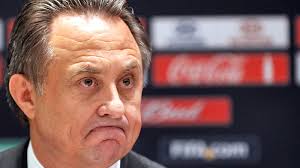By Andrew Warshaw
December 22 – UEFA have confirmed that Russia’s deputy prime minister Vitaly Mutko is among the declared candidates for five European vacancies on the FIFA Council but must still pass an eligibility check ahead of next April’s election.
For all the finger-pointing and suspicion arising out of the damning McLaren Report into state-sponsored doping in Russian sport – including football – there seems little sign of Mutko, who also heads Russia’s World Cup bid, being sanctioned by either FIFA or UEFA.
Two months ago he was promoted from Sports Minister to Deputy Prime Minister and still acts as president of the Russian Football Union even though simultaneously holding footballing and governmental positions is normally frowned upon by the sport’s authorities.
Mutko has served on FIFA’s top table since 2009 and however strong the western lobby against him, there seems little sign of him being forced to step down in the wake of the World Anti-Doping Agency investigation despite the fact that the sports ministry, at the time he was in charge, stands accused of directing a conspiracy that covered up hundreds of positive tests between 2011 and 2015.
Mutko has denied any wrongdoing and it will be fascinating to learn the results of his eligibility test. Also standing for a four-year term on the FIFA Council are Hungary’s Sandor Csanyi, Costakis Koutsokoumnis of Cyprus, Montenegro’s Dejan Savicevic and Iceland’s Geir Thorsteinsson. All head their respective national associations, with Savicevic the best known after an illustrious playing career with Red Star Belgrade and AC Milan.
In a statement UEFA said its administration “has submitted the completed eligibility questionnaires for all five candidates, to enable the FIFA Review Committee to carry out the necessary eligibility checks ahead of the election” which takes place at the UEFA congress in Helsinki on April 5.
It is not clear when these checks will be completed but assuming all five pass, they could all gain a place on the FIFA Council. Three long-standing members – Belgium’s Michel D’Hooghe, Senes Erzik of Turkey and Cypriot Marios Lefkaritis – are standing down while Germany’s Wolfgang Niersbach has just been banned for a year for his role in the 2006 World Cup bid scandal.
Technically that means there are four four-year terms up for grabs plus the remainder of Nierbach’s term, which runs until 2019. There could be more candidates for that seat, however, since the deadline for entries has just been announced for January 5.
The FIFA Council currently has 33 members but will eventually consist of 37, comprising FIFA president Gianni Infantino, eight vice-presidents and 28 members from the six confederations.
Contact the writer of this story at moc.l1745207891labto1745207891ofdlr1745207891owedi1745207891sni@n1745207891osloh1745207891cin.l1745207891uap1745207891

